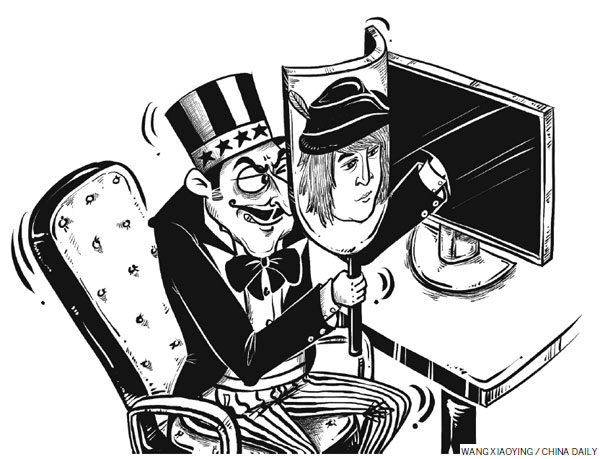US cyber charge ridiculous
By Mike Bastin (China Daily) Updated: 2014-05-22 07:01It was back in May 2013 that the US government first accused the Chinese military of intruding into US computers to steal sensitive data. But in recent days this seemingly relentless attack on the Chinese military took an incredible turn for the worst with the indictment by the US Justice Department of five Chinese military officers.
Incredibly the five Chinese military officers have been "charged" with stealing data from six US companies, causing a massive escalation in tension between the two global economic superpowers.
Despite the very public propaganda campaign waged by the Barack Obama administration, in a blatant attempt at diverting attention from its own current economic woes and increasing international isolation, until now no charges had been brought against any Chinese military officials for hacking.
The US government has struggled to maintain a shred of credibility in this and other related matters ever since Edward Snowden, a former US government contractor, began disclosure of documents proving irrefutably the extent of the US government's National Surveillance Agency (NSA) spying, both domestically and particularly internationally.
Indeed Snowden's whistleblowing appears to have no end in sight with one after another European government expressing dismay and disbelief at the apparent spying antics of the NSA.
Furthermore, unlike Snowden's disclosures on US government spying around the world, the NSA fail to provide the slightest shred of evidence in support of these "charges" and does not even detail the claimed "economic damage" done.
So, what is really behind this latest, potentially relationship-wrecking US government action?
In order to try to get behind this latest US government action, it is necessary to revisit the most alarming disclosures, and their impact, of Snowden's whistleblowing so far.
Chief among these has to be the documents alleging NSA snooping on the German chancellor Angela Merkel's personal phone line. In addition, the Italian and French governments have also come under the same sort of cyber-spying attack.
As a direct result, in March the European Parliament passed an important resolution condemning the US and EU surveillance programs. Specifically, the bill calls for suspension of trade talks, suspension of data sharing, and suspension of US corporate rights to European data.
It should be noted that this was no knee-jerk reaction but a move which followed months and months of painstakingly detailed inquiry into US spying practices.
It should also be noted that even legislation such as this recently compiled bill, outlined above, does not represent the end of this spying saga. Indeed it was the German leader who very recently spoke of the need to "build a new trust between Europe and the US government".
Not that European government and its citizens were the sole targets of the NSA's espionage activities. Snowden's leaks also expose the worldwide nature of the NSA's hacking operations. Hong Kong and cities on Chinese mainland were not spared with targets including leading Chinese universities, public officials and businesses.
But perhaps the greatest impact of all is the further breakdown in trust between the American people and the American government, as a result of the NSA's global spying operations. In a recent opinion poll a firm majority of US citizens expressed strong disapproval of the NSA's worldwide spying operations and maintained that this has weakened substantially US economic and political power around the world.
It is, therefore, clear that the recent decision to indict Chinese military officials on spying charges represents nothing other than a desperate attempt by the increasingly beleaguered US government to create a diversion from its increasingly international isolation. This panic measure aims to pacify US citizens' deep unease with its government's scant regard for freedom and civil liberty by embarking on a pathetic patriotic push against China.
The parlous state of the US economy has probably played no small part in the decision to announce these "charges". While the green shoots of economic spring are beginning to appear in many European economies, the US economy remains sluggish at best.
Not only will this announcement be met with total contempt outside the US, it will also add considerably to the deep despair held by the ordinary US citizens with their own government.
This will hamper any US government attempt at further integration and negotiation with its global trade partners and will probably haunt the current administration over the long term.
The Obama government will now be forever remembered not just as the "we spy" government but as the "we spy and lie" government.
It would appear that the most spectacular same-side goal has been scored for many years, even before this year's Football World Cup has begun.
The author is a visiting professor at the University of International Business and Economics in Beijing and a senior lecturer on marketing at Southampton Solent University's School of Business.











